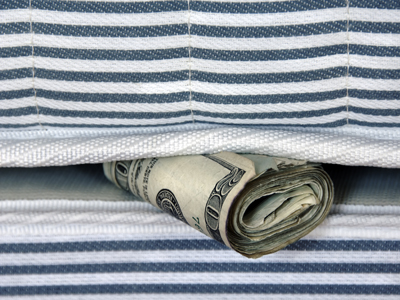
One of the most difficult challenges when purchasing a small business is expressed by this prospective buyer of a California liquor store for sale who is told by the seller that there is more money being made than shows up on the books.
Should the buyer accept that statement and go ahead with the small business purchase so he doesn't miss out on a good opportunity? Or would he be smart to consider the seller untrustworthy and pursue other small businesses being sold instead?
And this is a particularly difficult area for business brokers and agents who want to make sure the buyer gets as much pertinent information as possible, but don't want to make any misrepresentations about the income of the business. And no business broker or agent wants to find himself or herself the defendant in a criminal suit, accused by the IRS of conspiring with a seller who is avoiding paying taxes on business income.
Below Is Feedback, Opinions And Advice From Several Advisors & ProIntermediaries On BizBen.com:
"How about self-auditing the business over a period of a couple of weeks? Be at the store and compare cash register "Z's" or POS system reports to the complete "drawer" at the end of the day. If the owner/seller is not willing to allow you to confirm total sales, then don't buy this business."
-------------------------------------------------------
"Seeing is believing. Validating income is essential to the overall credibility of the business. As a broker, we understand that main street mom and pop business has their own creative ways of accounting. I suggest your offer be contingent on validation of income. Once the offer is accepted by the seller, you would then need to schedule time to see for yourself more like show me the money. Only then you could consider giving merit to sellers claims of revenue."
-------------------------------------------------------
"Unreported cash income is a very dangerous thing to make a business decision about.
Liquor stores are among the worst offenders at not recording all their sales. The question was asked if you should buy or pass on this business because of the unprovable sales? First, no business should be bought without due diligence. To believe what a seller tells you is like leaving your sheep with the wolf to guard. Sellers can prove almost anything they do if they really want to. The truth is they do not want to prove it, because it rarely matches what they are telling you. I had a buyer bring me a bag of liquor store receipts to do an audit. When I studied them I found that one register's receipts were only for a 12-hour period and the other was for a 24-hour period. Some days were missing so we couldn't reconstruct a sales report, because the seller didn't want us to be able to do it.
If the seller cannot prove what he tells you then go on to another deal. If he can prove it, have an expert review his proof. An uneducated buyer and his money are soon parted. By the way due diligence is not just about auditing the income and expenses it is about everything related to and surrounding the business. Things like a discount liquor store opening up in 6 months down the street. Some government agency is ready to close the store down for criminal charges like evasion of sales or income tax. Little Red Riding Hood beware, the wolf is dressed in Grandma's clothing and is planning on having you with his after closing drink of scotch"
-------------------------------------------------------
"I'll give you 2 good ideas to help verify the income of the business. Do them both. They should cross-verify sales.
First: Have the seller gather all of his purchase invoices for several months. I like to use summer and winter months as some locations sales will vary accordingly.
There is a direct correlation between purchases and sales. Most liquor stores overall mark when you calculate all products sold. I personally feel 30% is the right number to use for this purpose. Add up all the invoices and do the math. If he bought $10K of products his sales were very close to $13K.
Second: Do a physical observation. Whereby you stay in the store for a given period time and verify sales. You should be given access all opening hours to watch the seller ring the cash register. At the end of the day see the actual total income. Do this for 1 - 2 weeks. You need to at least complete a 1 week cycle. Multiply out the period of observation into a month and it should come close to the invoice calculation method above. Also during the observation period you should pay close attention to the suppliers bringing in merchandise. These should be the same suppliers you are seeing in adding up invoices. Pay attention to how many times a week each one show up. This should be consistent to what you see in the monthly invoices."
-------------------------------------------------------
"Many businesses with cash sales where the cash is not reported are difficult to determine gross sales and therefore making it difficult to determine profitability. The only way to answer the question of how much the gross sales are for a business with a cash component is to conduct a 2 week audit by observing the business, by checking the purchases of product over a period of time, by checking utilities consumed (for coin laundries) or by auditing 2 week's worth of recorded video of the business (if the video shows the cash registers. The risk with observation is how do you decide which 2 weeks to observe, especially if the business has a seasonality component? The risk with checking purchases is that sometimes suppliers to those businesses play the same game--they sell product for cash with no paperwork. The risk with a video is whether or not it has been manipulated".
-------------------------------------------------------
"Buying a business based on unreported income is always risky. Liquor stores are a prime example. Should you buy it? Depends on your tolerance for risk both in terms of whether the sales are truly under reported and whether you can withstand a potential crackdown by the Sales Tax collectors. There are over 120 Liquor stores in California that have sustained significant fines and back taxes in previous years. You might be the next one."
-------------------------------------------------------
"It is customary for owners of liquor stores, convenience stores and other cash based businesses to claim revenue in excess of that which is reported on their tax returns when they choose to sell the business. After all, the higher the revenue, the more they believe they will get for the business. When it comes to claims of unreported cash, the seller generally has no way to substantiate it. Sure, you can look at register tapes; however, if the sale wasn't rung up then it won't show on the z-tapes. They may have a cash journal; however, you have no way of knowing if the log entries are real or if the entire journal was written in a few hours over a weekend.
If you are looking at purchasing this liquor store, ask questions of the owner not the broker. The broker doesn't work there and can't tell you what percentage of cash is or is not being declared. The broker is simply repeating what he/she has been told. Ask questions in person and watch the seller's eyes and the seller's body language. If you sense some truth in the story and you want to proceed, you will need an observation period before or as part of your due diligence. A day or two will not cut it. You will need to sit in the store and observe for two weeks to a month minimum.
Take notes and track daily income, checks, cash, credit cards, deposits, etc. Also track purchases, payroll, and other expenses and note if they were paid by cash, check, credit card, etc. If the seller or broker will not allow an observation period, walk away. It's not only important to know how much cash is coming in as equally or more important to know how much cash is going out. Are the employees being paid in cash or on the books? Are vendors and suppliers being paid cash?
As for whether or not you should buy the liquor store "you are the only one that can make that decision. Do your homework and depending on your comfort zone and your risk tolerance, make a decision you can live with."
Contributor:


Laundry consulting, due diligence, buyer representation: We preview laundries for you and evaluate them. 28 years laundry industry experience: buying, selling, valuing, retooling, analyzing, consulting services for laundry buyers and entrepreneurs in California. Contact us today about our services.
ServingSouthern California
McGovern Escrow Services, Inc., is a leading independent escrow company. We are a trusted partner with our clients, assisting them through the tangled bulk sale & liquor license transfer process. We provide attentive, quality & innovative customer service. Phone Elizabeth McGovern at 415-735-3645.
ServingSan Francisco Bay Area, North Bay, Central Valley
I am the Founder Of BizBen.com. I consult daily with intermediaries, business buyers, owner/sellers & advisors daily about buying and selling California small to mid-sized businesses. Contact me today about joining & utilizing BizBen, consultations, & advisory services.
ServingNationwide - All Areas
If your business involves alcoholic beverage sales, we can help. Obtaining a liquor license transfer or selling a business with a license in California does not have to be a frustrating and overwhelming process. We have procured thousands of licenses for our clients.
ServingAll Of California
I am an experienced entrepreneur, attorney, & business professor. I & my EvergreenGold® team offer business owners sound advice & expertise to build business value & achieve profitable sales. Call me today for a business evaluation & SWOT analysis for your business anywhere in the USA.
ServingNationwide
Cheryl's a restaurant business broker, over 25 years in the bar and restaurant industry coupled with a J.D. Cheryl works tirelessly to create successful strategies and effective negotiations for those who wish to purchase a new or sell an existing bar, restaurant, cafe, or night club. 415-309-2722
ServingCity Of San Francisco
The Veld Group provides a refreshing approach to Business Brokerage, Mergers & Acquisitions and Business Consulting and Valuations. From Your Street to Wall Street, we cater to Main Street Businesses as well as more complex Strategic Firms and Start-Ups.
ServingSouthern California
For over 25 years Peter Siegel, MBA has been providing niche business purchase financial advisory and loan placement services with SBA Loans, Non SBA Financing, Retirement Plan Conversions, Note Restructures, etc. Call me regarding business purchase financing and to get pre-qualified: 925-785-3118.
ServingNationwide - All Areas

Laundromats and coin operated Laundromats are popular choices among business buyers as they often can be successfully run as an absentee run business. You need to be strategic about when you sell your Laundromat so you don't get taken to the cleaners by a buyer and so that you maximize your profits.

Buying a professional service business, like a dental practice, is one of the most profitable ventures you can enter into if you are considering becoming a small business owner. In this blog, Peter Siegel, MBA discusses six things you need to know about buying a successful dental practice or office.

Chuck Post a laundry consultant, specialty broker, buyer representative & due diligence advisor starts this discussion on why it's important to have an exit strategy in mind while buying a laundromat! He & others explain why this concept is so important for buyers especially in the laundry business.

Buying a liquor store can present some major challenges to business buyers - a recent client on the BizBen ProBuy Program relates to Peter Siegel, MBA what the major challenges may be when searching for and buying a Californa liquor store business. I welcome other Advisors to weigh in on this topic.

Sometimes business brokers just can't win with their clients, because if an offer comes in too fast & too early then they must have lowballed the price & the seller is suspicious, and if not enough offers come in after putting the business on the market - they may look unproductive to their clients.

